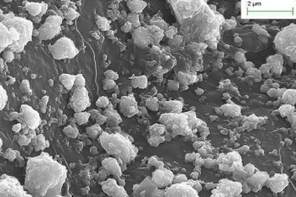See on Scoop.it – Curiosopernatura
Trees planted along a city street screen residents from sun and noise—and from tiny particles that pollute urban air. A new study shows that tree leaves can capture more than 50% of the particulate matter that’s a prime component of urban pollution and a trigger for disease (Environ. Sci. Technol. 2013, DOI: 10.1021/es404363m).
In urban settings, particulates come primarily from car exhaust, brake pad wear, and road dust and can contain metals, such as iron and lead. The Environmental Protection Agency classifies particulates in three size ranges: less than 1 μm (PM1), up to 2.5 μm (PM2.5), and up to 10 μm (PM10) in diameter. These particles are tiny enough for people to inhale and can exacerbate heart disease, asthma, and other health conditions.
Researchers want to understand how trees capture particles so that urban planners might eventually take advantage of these natural tools for mitigating pollution. However, modeling this process is challenging because air flow and particle movement on a street follow complex fluid dynamics. Models have shown wildly varying results for just how much particulate matter trees can trap, with some as low as 1% and others as high as 60%.
See on cen.acs.org
